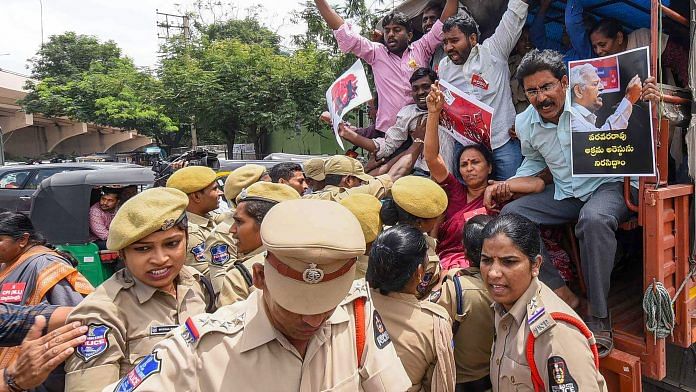Maoist-Naxal forces have weakened in their actual areas of origin, but urban sympathisers have expanded their influence.
Going by the confusion over the arrest of five Left-leaning activists, it seems that yet another government has embarked on yet another shoddy action plan that is certain to leave it red-faced and prove counterproductive.
The knee-jerk reaction and incoherent strategies of successive governments, including Modi’s, to deal with the new Maoist-Naxal problem has yielded poor or no results.
In the recent arrests under the stringent Unlawful Activities (Prevention) Act, the apex court has granted interim relief but has not struck down the charges.
It is now for the prosecution to prove criminal conspiracy and seek a stern punishment. In all likelihood, the case may take a long time to come to its logical conclusion.
According to the police and investigating agencies responsible for the arrests, the state agencies have strong evidence to prove that those arrested have links to the banned Communist Party of India (Maoist).
Authorities also claimed that those arrested were “involved in underground movement” to destabilise the duly elected government.
The Maoist-Naxal struggle
It is no secret that Left-leaning outfits of various shades, claiming to be influenced by Marx, Mao and Lenin, have had a long history of trying to subvert democratically elected governments, create chaos and then seize political power to further their agenda of autocratic rule.
In most countries, extreme violence has preceded regime changes, and mass murder and brutal purges of ‘counter-revolutionaries’ within the outfits and parties have been the order of the day. Mao’s brutalities and Stalin’s purges are in the public domain.
Also read: For Left-liberals, winning hashtag battles with #MeTooUrbanNaxal seems to be enough
The Communist movement in India started as a political movement. Soon after Independence, the front split into various groups, the most revolutionary, and perhaps bloody, being the Naxal movement started by Charu Mazumdar. The Maoist-Naxal struggle was at its peak for over three decades from the 1960s but had started losing steam during the lifetime of its founder, Charu Mazumdar.
Counter-insurgency operation
Although the movement failed to overthrow elected governments, the violence and brutality that was perpetuated by it took a heavy toll on the administration and the law-enforcing authorities. Governments kept strengthening the police and security forces, but met with resistance on the ground in areas under the Naxal-Maoist control.
Maoist consolidation and mobilisation continued despite the arrest of several prominent Maoist-Naxal leaders. Their organisational base was strong, and at times complex. Yet, it showed enough dynamism to not only survive the absence of leadership, but also expand its base.
The jungle-based rural and agrarian Naxal movement also attracted a large number of supporters from urban centres – the tag ‘Urban Naxals’ has come to be associated with them in recent times. The term has been used for the five arrested activists too.
Maoist-Naxal networks were accused of using unlawful means like extortion, kidnapping, looting banks and government offices, coercive ‘tax’ collection and generally targeting infrastructure and industrial units to finance their war against the state.
Even as the union and state governments mounted counter-insurgency operations against Maoist-Naxal forces, their urban sympathisers were accused of providing them legal, political and financial support.
Also read: Bhima-Koregaon arrests, Rafale row, note ban have one common problem: BJP’s execution
While the Maoist-Naxal forces have weakened in their actual areas of origin, the urban sympathisers have been able to expand their influence.
The road ahead
Unfortunately, the political and security establishments appear to be inflexible and refuse to learn any lessons from previous disasters, which have resulted in loss of life of security personnel and civilians.
Successive governments have persisted with policies that have tied them in knots. Further, the socio-political fallout of such policies has only made matters difficult for the state.
Consensus-building among all political and social groups on the issue should be first step towards tackling the new Maoist-Naxal problem.
A greater transparency in governance and, above all, a humane approach to understand the issue can offer more sustainable solutions in dealing with this problem.
The author is former editor of ‘Organiser’.




Mr Chari, I don’t understand your concern. What is the problem with one set of people sympathising with other whose basic rights are being undermined by the state and vested interest of all sorts (read big business). Economic and social policies propounded by RSS and implemented by BJP now with vengeance (earlier on different lines and different context by Congress) are the ones responsible for messing up the country – please recall mob lynching and how land acquisitions laws are being manipulated to hand over land to cronies. Everyone knows how BJP funds its elections and who funds them and why. Some of you pretend to be intellectual but you refuse to see all aspects of a problem, as you are blinded by an ideology that has very little to do with our country’s reality. What great achievement have we go with DeMon other than destroying lives? Corruption has come down only the mouthpiece studios that are equally blinded as our leadership. It will good if people like yourself at least recognise that we have a problem to solve rather than blame the poor who are increasingly at the receiving end and stop blaming people who care for the poor.
The present Govt Mr Rajnath Singh and other have coined the word Urban Naxal Is Mr Chari confirming the same ? I remember Mr Chari saying on TV that Hindu terror is phrase coined by Mr Chidambram and Mr Shinde of Congress there is no such terror existing then what is Sanathan Sanstha / Hindu Janjagruti Samithi/Shiv Parthisthan murders of Dabholkar/Gauri Lankesh
At some stage, when the back of the movement has been broken, there may be space to start a political dialogue and bring closure to this long running insurgency. 2. Corporates functioning in thes areas have no option but to yield to demands for funds.